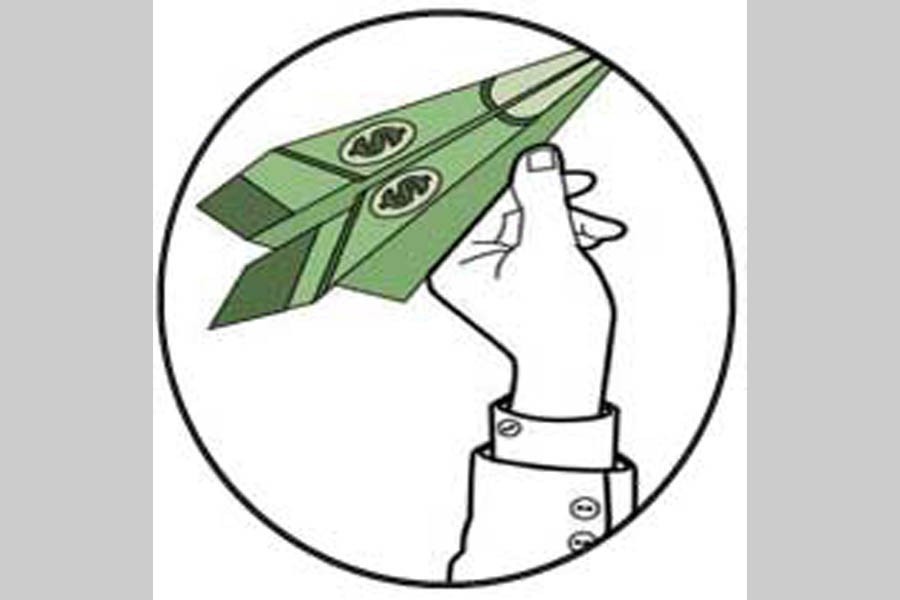The debate about capital flight from Bangladesh is nothing new. However, the amount of capital exodus was relatively low even a decade ago. It is also presumed that capital flight had increased significantly in the last decade when the size of the economy also expanded. The basic reason behind the debate is viewing the capital flight as a bad thing. There is a misperception that capital flight is always illegal. Such widespread misperception makes the discussion on capital flight biased and problematic.
Nevertheless, a special tax treatment regarding undisclosed offshore assets, proposed in the national budget for the next fiscal year (FY23), sparks a fresh debate about the capital flight issue. According to the proposal, if a taxpayer pays a certain amount of tax, the government will not raise any question about the source of the money or asset parked abroad. One has to pay 15 per cent tax for immovable property not repatriated to Bangladesh; 10 per cent for movable property (including cash and cash equivalents) not repatriated to the country; and 7 per cent for cash and cash equivalents repatriated to Bangladesh.
Through the proposal, the government has acknowledged the reality of illegal transfer of money or illicit financial flow from the country though there are no official statistics in this regard. The proposed tax provision is also a recognition of capital flight.
There is no universally accepted definition of capital flight which can be abnormal legal outflows, extra-legal or illegal outflows, and outflows emanating from criminal or unlawful activities. Some define capital flight as the 'outflow of capital from a country due to negative monetary policies, such as currency depreciation, or carry trades in which low-interest-rate currencies are exchanged for higher-return assets.' The flight 'may be legal when foreign investors repatriate capital back home or 'illegal, which occurs in economies with capital controls that restrict the transfer of assets out of the country.'
It is possible to trace the legal outflows as relevant transaction record is there. Moreover, the flows are also not necessarily bad. The outward foreign direct investment (OFDI) from Bangladesh is an example of this connection. The World Investment Report 2022, prepared and published by the United Nations Conference on Trade and Development (UNCTAD), showed that outflows of FDI from Bangladesh increased by around eight times in 2021 to US$92 million from $12 million in 2020. The last year's amount is the second-highest annual OFDI in the country. It was in 2017 when $142 million OFDI was recorded, the highest amount so far.
UNCTAD data is based on the country's central bank statistics. Over the years, Bangladesh Bank has made rigorous efforts to improve the quality of FDI statistics. As a result, it is now possible to get a better picture of both the inward and outward FDI. However, more areas required improvement with detailed statistics. For example, the half-yearly FDI and external debt statistics report must provide information about the Bangladeshi firms investing abroad to make it transparent and avoid confusion.
In fact, in 2015, the Bangladesh government amended the 1947 Act permitting outbound investment for export-related enterprises with some conditions. This legal scope helps to increase the OFDI, and now, such investments by Bangladeshi firms have gone to more than 20 host countries which is a legal capital flight.
Due to misperception about capital flight, however, the OFDI statistics are also misinterpreted by many. Quoting the UNCTAD data only and not checking the revealed statistics with the central bank is responsible in this regard. For instance, some argued that the amount of illegal investment abroad by Bangladeshis is nine times higher than the officially recorded data. According to them, Bangladeshis illegal investment abroad reached $350 million at the end of 2021. A vernacular daily also published a report in this connection. It is unclear how they reached the conclusion about the illegal investment. According to Bangladesh Bank, the total stock of OFDI stood at around $390 million at the end of 2021. The figure is also quoted in UNCTAD's WIR 2022. What is officially recognised cannot be an illegal or illicit flow of capital.
Instead of analysing the official statistics properly and seeking more data to get a clear picture, relying on partial data will not help to understand the real impact of capital flight. This is also the case in terms of Swiss bank deposits. In 2021, Bangladesh-linked money in the Swiss banks jumped by 54 per cent from 2020. From this, many concluded that the illegal flight of capital from Bangladesh to Switzerland increased by 54 per cent, which is not true. Though the deposits with Swiss banks are generally perceived as stashed money, this is not entirely right. The deposits contain both legal and illegal amounts, and there is no easy way to detect the illegal portion.
These limitations in interpreting the OFDI or Swiss bank statistics do not extenuate the illegal money transfer by a section of people from the country. Moreover, different proxy indicators confirm a growing trend of parking the tax-evaded income in offshore jurisdictions or tax havens. Time will tell how the government's proposed fiscal steps to disclose such money are going to in the future.


